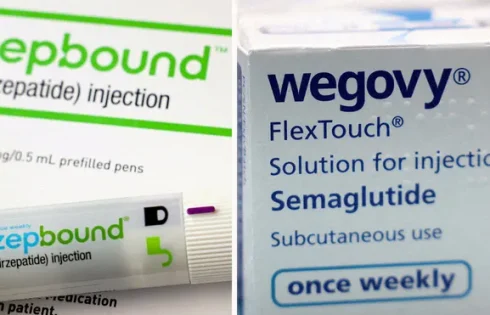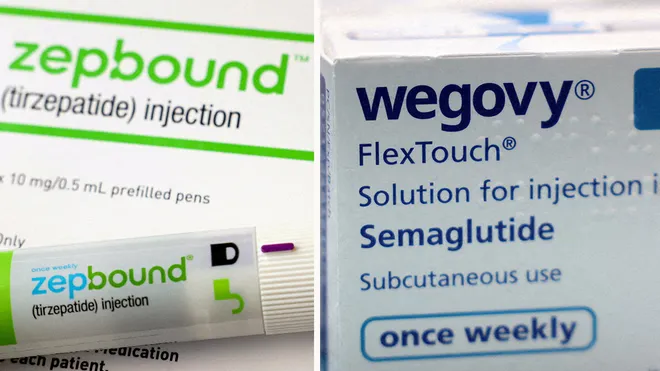
Buy now, pay later is a common tool to help shoppers purchase things like consumer electronics and furniture. But can this short-term financing method help people pay for expensive weight-loss drugs?
Customers who struggle to afford the $1,000-plus list price for weight-loss drugs Zepbound and Wegovy will have the option to buy now and pay later under a partnership announced Tuesday by telehealth provider FuturHealth and consumer finance company Affirm.
FuturHealth CEO Luke Mahoney said the partnership gives customers one more option to access the popular glucagon-like peptide-1, or GLP-1, weight-loss drugs. Consumers are struggling to afford brand-name GLP-1 drugs, and the less expensive compounded versions are expected to soon be phased out.
“The pricing has kept the branded meds out of reach for a lot of people,” said Mahoney.
Why are consumer struggling to pay for weight-loss drugs?
The financing option comes as consumers who’ve used less expensive compounded versions of the popular weight-loss drugs will need to seek other options.
The Food and Drug Administration allows compounding pharmacies sell copies of drugs when the medications are in short supply. Yet federal regulators have declared the blockbuster weight-loss drugs Wegovy (semaglutide) and Zepbound (tirzepatide) are no longer in shortage. That means consumers who’ve used compounded weight-loss drugs via telehealth providers will soon need to switch to brand name drugs or pursue other options.
The industry trade group Outsourcing Facilities Association sued the FDA in U.S. District Court in Texas and asked a judge to issue an order delaying enforcement, but on March 5 a judge rejected the group’s request.
Pharmacies can dispense compounded semaglutide, which is sold under the brand Wegovy, until April 22. Suppliers must cease distributing compounded semaglutide by May 22.
Health insurers have been reluctant to cover GLP-1 medications for weight loss. Most large employers cover diabetes drugs such as Ozempic and Mounjaro, but a 2024 survey by benefits consultant Mercer said less than half of large employers covered GLP-1 drugs for obesity.
Drug companies offer discounts
Both Zepbound-maker Eli Lilly and Wegovy-maker Novo Nordisk have discounted the price of their weight-loss medications for people who pay out of pocket.
Novo Nordisk said patients who are prescribed Wegovy can purchase the obesity drug through the company’s NovoCare Pharmacy for $499 per month. Lilly’s prices differed based on dosage. Customers who buy a month’s supply of 2.5 mg vials will pay $349, and 5 mg vials will cost $499.
How does buy now, pay later work?
Consumers who select Affirm’s buy now, pay later option on FuturHealth’s website must undergo a quick eligibility check. They can choose biweekly or monthly payment plans to pay for their medication, according to Affirm and FuturHealth.
Unlike one-time purchases for consumer goods, weight-loss medications are routinely refilled. So consumers could accrue recurring charges if they stay on the medication. Plus, FuturHealth charges $129.99 per month for a package that includes access to obesity-trained medical professionals, though discounts are available.
FuturHealth does not prescribe drugs but connects customers with licensed medical professionals who prescribe weight-loss medication, if appropriate. The company, for now, allows consumers to get compounded semaglutide, which pharmacies are allowed to dispense over the next month, according to the FDA. The company also offers the branded weight-loss drugs Wegovy and Zepbound.
“We didn’t build this company under the notion that you can just be on meds forever,” Mahoney said. “Some people may need to do that (stay on medications), and that’s totally valid. But for the vast majority, our goal is to bring you on, educate you through the tools and offerings we have with the idea that you will one day be off medication.”
Doctors have recommended that patients keep taking the medication as long as necessary to achieve their goals, whether to treat diabetes or maintain weight loss. But a study earlier this year found 65% of those without diabetes discontinued the drugs in less than one year, according to a study in JAMA Network Open. Those with higher incomes and fewer side effects were more likely to continue taking the medication, the study said.
Yvonne Herrera, a vice president at Affirm, said in a statement the financing arrangement gives consumers “the freedom to manage costs on their own terms, without gotchas.”
Still, a recent survey by the business intelligence firm Morning Consult found consumers who use short-term financing often borrow and spend a lot and have difficulty keeping up with debt payments.
More than 2 out of 5 users carry buy now, pay later debt and one-quarter of them missed a payment last month, the survey showed. About 1 in 4 said they paid late fees; 27% saw a decline in their credit score and 22% interacted with a debt collector.
In a news release, Affirm said it will approve financing only if the company believes the debt will be repaid, and the company said it doesn’t charge late or hidden fees. Interest rate charges range from 0 to 36%, Affirm said.
Herrera said such financing hasn’t traditionally been available in health care, and she said Affirm has experienced 90% year-over-year growth in provider partnerships.

